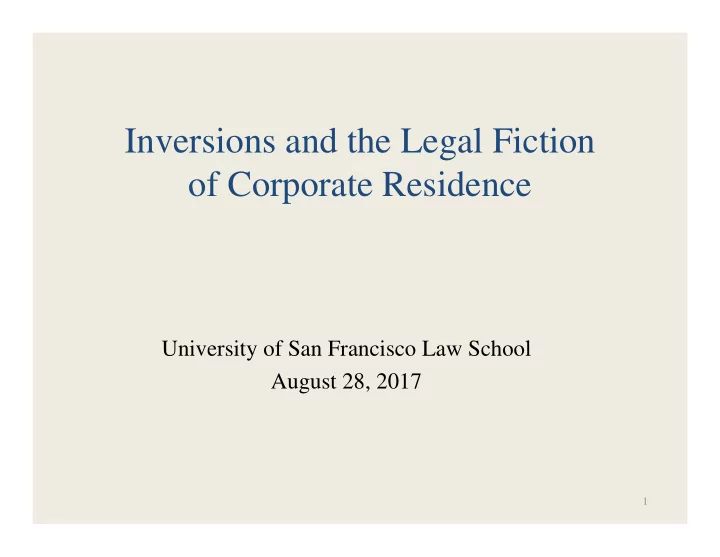

Inversions and the Legal Fiction of Corporate Residence University of San Francisco Law School August 28, 2017 1
What’s an inversion? If Burger King “left” the U.S., why are they still here? Inverting companies: Benedict Arnolds or unduly put-upon? The residence concept and individuals. 2
Looking behind a legal fiction Corporations are legal entities, not people – so tax residence is a legal fiction. But does anything go? (Could global Apple be Polish or Norwegian?) Purposes are critical in evaluating a legal fiction, so what does corporate tax residence do, and why? 3
Why does corporate residence matter? 1) Under treaties 2) Allows the residence country to tax “foreign source income” (FSI) --Why would one want to do this? 4
Reasons for taxing FSI --Due to the “Monty Python tax principle”? Taxing resident individuals; taxing domestic business activity. Individuals: “ability to pay” -> worldwide tax Corporate income tax as backstop. Domestic business activity: controlled foreign corporation (CFC) rules can combat base erosion, profit-shifting. 5
How CFC rules can affect profit-shifting Where FSI is taxed, source becomes irrelevant (FTC limits aside) . CFC rules typically reach passive &/or low-tax income. Passive income & the use of intra-group debt. Other low-tax income & reducing the payoff to profit-shifting. Were profits actually earned in the tax havens where they’re reported? 6
Keeping CFC rules in one’s toolkit CFC rules can only apply to resident companies. The tradeoff: efficacy re. these companies vs. tax-advantaging other companies. Most countries with “territorial” tax systems have CFC rules! 7
Back to inversions The U.S. response to profit-shifting may over-emphasize CFC rules. Other tools: transfer pricing & anti-earnings stripping rules. Transfer pricing: hard to do well, but “cost-sharing” is an unforced error. Anti-earnings-stripping: often are tougher abroad. 8
Reason # 2 for inversions US companies don’t benefit from paying interest to their foreign subs. This is the #2 reason for the recent wave of U.S. corporate inversions Reason #1 is deferral / trapped earnings. $2.1 trillion is “trapped” abroad – but what does that mean? 9
Defining corporate residence Place of incorporation vs. “real seat” (HQ, operations, etc.). Both approaches face declining efficacy. Rise of cross-border shareholding & global financial integration. Cheaper transport & communication, rise of “decentered” global firms. Hence, “rising corporate residence electivity.” 10
What are corporate inversions? Old-style self-inversions & §7874. The small comeback: life-cycle planning. But then new-style inversions. Business deals, but also tax-motivated. Post-inversion sidestepping of taxable repatriations, CFC rules. The Obama Administration response (to be scaled back?). But just a stopgap – need to reexamine corporate residence. 11
Approach # 1 to rising corporate residence electivity Make corporate residence standards tougher? E.g., disjunctive approach. Or, devise new corporate residence standards. Fleming-Peroni-Shay (2016): >50% owned by U.S. residents. Feasible post-FATCA?? 12
Dual residence & nowhere-residence F-P-S also say: stock traded/listed/marketed in the U.S. The dual-resident problem. Dual residence & nowhere-residence are familiar issues. U.S. & U.K. on dual residence. Might / should rules address nowhere residence? 13
Approach # 2 to rising corporate residence electivity Reduce the importance of corporate residence? E.g., lower corporate taxes, less reliance on CFC rules. Replace transfer pricing with formulary apportionment? Shift more corporate taxes to the owner level? (Grubert-Altshuler; Toder-Viard) 14
What to expect Yogi Berra: “It’s tough to make predictions, especially about the future.” --Not quite “Apocalypse Now.” --The decline of corporate taxation has (so far) lagged predictions. --But what happens depends on the political system. 15
Recommend
More recommend